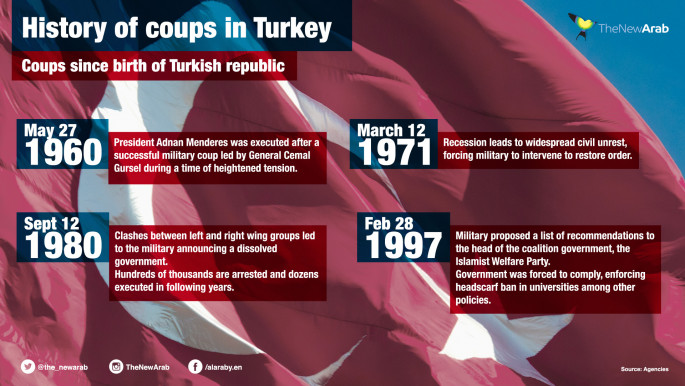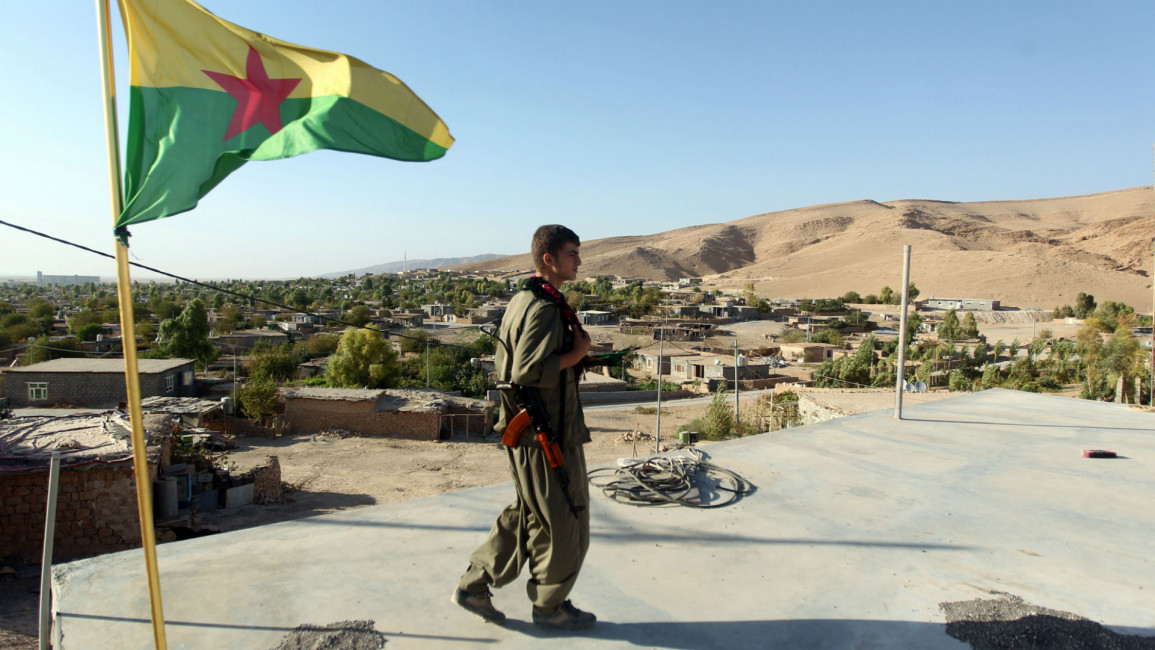
Where does the attempted coup leave Turkey's Kurds?
While the entire world was trying to make sense of the military coup attempt in Turkey on 15 July, the Kurds' view fell off the radar. All sorts of conspiracies around the coup were discussed, without any consideration of the stance of the Kurdish leadership.
This is, in part, related to the fact that the Kurdish parties have distanced themselves from the current constellation. Why did both the Kurdistan Workers' Party (the PKK's armed organisation), and the Peoples' Democratic Party (the HDP, a Social-Democratic Party mainly led by Kurds) steer clear of the events? The answer can be found by taking a look back at Kurdish politics during previous coups in Turkey.
In July 1908, the "Young Turks" organised an armed coup against Sultan Abdul Hamid II's government. But the secular Young Turks were not alone in toppling the erstwhile regime. Armenians - oppressed by the Sultan - pushed for social and economic reforms in western Armenia (today Eastern Turkey).
The Sultan, either ignored or responded brutally to the Armenian demands, often triggering Kurdish tribes to clash with Armenian peasants. In 1908, the Armenian Revolutionary Federation (known as the Tashnag - Social Democratic and Nationalist Party) feeling hopeless, allied itself with the Young Turks to depose the Sultan.
Though successful, the coup arguably further polarised the sectarian tension between the majority Sunni Turks and "infidel" Armenians. The Sultan's supporters viewed the new government as an "infidel state controlling a Muslim empire". The result was the counter coup of 1909, an attempt to dismantle the Second Constitutional Era of the Ottoman Empire and replace it with an autocracy under Sultan Abdul Hamid II.
 |
Despite being in prison for 17 years, PKK founder Abdullah Ocalan has been the only leader in Turkey and the Middle East to foresee what was going to happen in Turkey |  |
The Sultan's supporters took revenge on the Armenians, and as a result, around 30,000 Armenians were massacred in Adana province. In 1913, Ferriman Z. Duckett published a book referring to the massacres of Adana as a "Holocaust". Eventually, the counter coup failed, but the Armenians paid a heavy price. The massacre investigation was closed and "forgotten". A decade later, both the Turkish coup and counter coup organisers decided to put an end to the Armenian Question in the empire.
Today, if the Kurdish leadership in Turkey had participated in the "coup" it might have faced a similar fate. If the coup was orchestrated by Erdogan to consolidate and centralise his power, the Kurds would have fallen into the trap and would have been viewed as "conspirators" and "foreign agents".
In the wake of last week's attempted coup, it was not surprising to see many media outlets drawing parallels with the Reichstag fire. The sight of the Turkish parliament - which was bombed by the pro-coup airforce - was reminiscent of the Reichstag fire in Germany on February 27, 1933, about a month after Adolf Hitler became the Chancellor.
| [Click to enlarge] | |
 |
The similarities are not limited to the visible damage of both parliament buildings. The Reichstag fire was also a last nail in the coffin of democracy in Germany. On the evening of the Reichstag fire, without investigations, Hitler blamed the incident on the Communists. This was the turning point in German history.
Hitler became an absolute leader, the Nazis took control of all state institutions and the multiparty system was abolished. Thus, the most important issue was not in fact, who had set fire to the Reichstag, but rather what came out of it. This explains co-chair of the HDP, Selahattin Demirtas' cautious approach, as he declared: "Those who waged the coup attempted to target MPs who are elected by the people; this is a catastrophic event."
In a previous statement, Demirtas claimed that they had been against coups throughout history, and if such things were to happen again, they would stand against it. He further emphasised that coups had never supported or endorsed democracy in Turkey.
As a result, Turkish Prime Minister Binali Yildirim thanked the HDP for his condemnation of the the attempted coup. But just a few hours later, AKP supporters carried out simultaneous attacks on three HDP offices in Osmaniye, Malatya and Iskenderun.
Despite being in prison for 17 years, PKK founder Abdullah Ocalan has been the only leader in Turkey and the Middle East to foresee what was going to happen in Turkey. He had warned: "If the resolution process [of the Kurdish question] comes to an end they are going to implement the coup mechanism. They are going to attempt a coup in Turkey. The resolution process is an obstacle in the way of a coup."
Ocalan is neither an oracle nor a fortuneteller. He has lived through military coups and has had strong contacts with the Palestinian, Armenian and the Arab Marxist organisations that were engaged in open military struggle with Turkey and Israel during the 1980s.
 |
Erdogan will do his best to marginalise and suppress the Kurdish democratic voices and push them towards radicalisation |  |
Moreover, the umbrella organisation of the Kurdish movement in Turkey, the Kurdistan Communities Union (KCK) has released a statement regarding the wrong, stating:
"There has been a coup attempt by persons whose identity and purpose is yet not clear. This attempt comes just before the military council meeting, where Recep Tayyip Erdogan was reportedly going to assign generals close to himself to the army's top tier. Another striking dimension of the coup attempt is that it comes at a time when discussions about the fascist AKP government's foreign policy were taking place."
The statement concluded with a portrayal of Erdogan and the "fascist AKP dictatorship" as if they were democratic after this coup attempt, in an approach that is even more dangerous than the coup attempt itself.
Though many Kurds in Turkey now despise President Erdogan and his government, they cannot view the military as their saviors either. It was the Turkish military after the 1971 and 1980 coups that led the harshest crackdowns in Turkey's history against leftists and Kurds.
The ambiguous future of the Kurds is still not clear; some argue they are a hopeless case, regardless of whether they are under secular or religious rule.
They may face a fate similar to that of Armenians and Assyrians. Turkey under Erdogan is in no position to compromise and grant political rights to the Kurdish community. Instead, Erdogan will do his best to marginalise and suppress the Kurdish democratic voices and push them towards radicalisation.
This could lead to drastic consequences; if Kurds feel the heat, they may once again appeal to heaven, leading potentially to violence in Anatolia.
Yeghia Tashjian is a Lebanese-Armenian political activist, researcher and blogger. He founded the New Eastern Politics forum/blog in 2010. Currently, he is the regional officer of Women in War gender-based think tank and research assistant at Armenian Diaspora Research Center at Haigazian Univeristy.
Opinions expressed in this article remain those of the author and do not necessarily represent those of The New Arab, its editorial board or staff.




